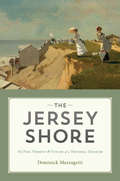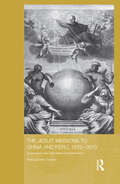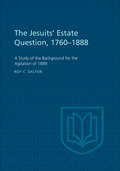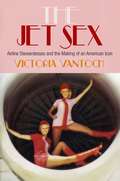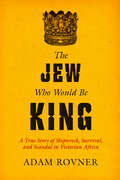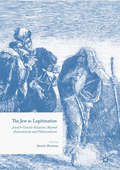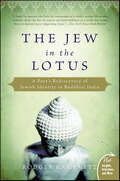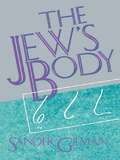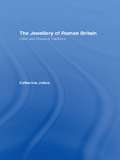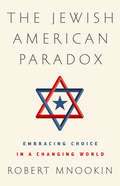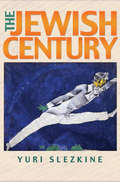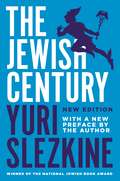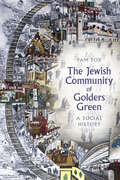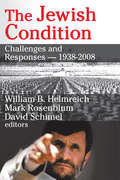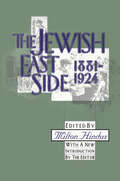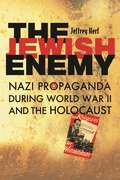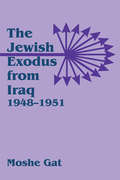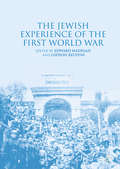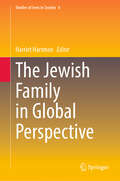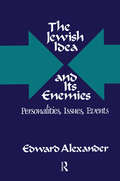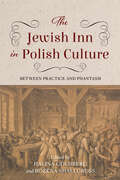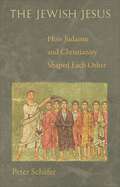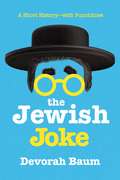- Table View
- List View
The Jersey Shore: The Past, Present & Future of a National Treasure
by Dominick MazzagettiIn The Jersey Shore, Dominick Mazzagetti provides a modern re-telling of the history, culture, and landscapes of this famous region, from the 1600s to the present. The Shore, from Sandy Hook to Cape May, became a national resort in the late 1800s and contributes enormously to New Jersey’s economy today. The devastation of Hurricane Sandy in 2012 underscored the area’s central place in the state’s identity and the rebuilding efforts after the storm restored its economic health. Divided into chronological and thematic sections, this book will attract general readers interested in the history of the Shore: how it appeared to early European explorers; how the earliest settlers came to the beaches for the whaling trade; the first attractions for tourists in the nineteenth century; and how the coming of railroads, and ultimately automobiles, transformed the Shore into a major vacation destination over a century later. Mazzagetti also explores how the impact of changing national mores on development, race relations, and the environment, impacted the Shore in recent decades and will into the future. Ultimately, this book is an enthusiastic and comprehensive portrait by a native son, whose passion for the region is shared by millions of beachgoers throughout the Northeast.
The Jesuit Missions to China and Peru, 1570-1610: Expectations and Appraisals of Expansionism (Routledge Studies in the Modern History of Asia)
by Ana Carolina HosneThe rulers of the overseas empires summoned the Society of Jesus to evangelize their new subjects in the ‘New World’ which Spain and Portugal shared; this book is about how two different missions, in China and Peru, evolved in the early modern world. From a European perspective, this book is about the way Christianity expanded in the early modern period, craving universalism. In China, Matteo Ricci was so impressed by the influence that the scholar-officials were able to exert on the Ming Emperor himself that he likened them to the philosopher-kings of Plato’s Republic. The Jesuits in China were in the hands of the scholar-officials, with the Emperor at the apex, who had the power to decide whether they could stay or not. Meanwhile, in Peru, the Society of Jesus was required to impose Tridentine Catholicism by Philip II, independently of Rome, a task that entailed compliance with the colonial authorities’ demands. This book explores how leading Jesuits, Matteo Ricci (1552-1610) in China and José de Acosta (1540-1600) in Peru, envisioned mission projects and reflected them on the catechisms they both composed, with a remarkable power of endurance. It offers a reflection on how the Jesuits conceived and assessed these mission spaces, in which their keen political acumen and a certain taste for power unfolded, playing key roles in envisioning new doctrinal directions and reflecting them in their doctrinal texts.
The Jesuits' Estate Question, 1760-1888: A Study of the Background for the Agitation of 1889 (Canadian Studies in History and Government #11)
by Roy DaltonMore than a hundred years of trouble followed the land grant of half a million acres along the St. Lawrence River to the Jesuits. The history of this land is a turbulent one that involved every area of colonial settlement and finally threatened Confederation. In 1888 the Quebec legislature passed an "Act Respecting the Settlement of the Jesuits' Estates": the result was a storm of protest that came close to shattering the union of the provinces. At the time of this Act there was no balanced historical account of the Jesuits' estates. nor until this one has there been any subsequent study that has ever begun to explore their tangled history. Professor Dalton provides a badly needed investigation into this area of Canadian history: his work is unbiased and thorough and offers new material for a reappraisal of this century of our past. (Canadian Studies in History and Government, No. 11.)
The Jet Sex
by Victoria VantochIn the years after World War II, the airline stewardess became one of the most celebrated symbols of American womanhood. Stewardesses appeared on magazine covers, on lecture circuits, and in ad campaigns for everything from milk to cigarettes. Airlines enlisted them to pose for publicity shots, mingle with international dignitaries, and even serve (in sequined minidresses) as the official hostesses at Richard Nixon's inaugural ball. Embodying mainstream America's perfect woman, the stewardess was an ambassador of femininity and the American way both at home and abroad. Young, beautiful, unmarried, intelligent, charming, and nurturing, she inspired young girls everywhere to set their sights on the sky.In The Jet Sex, Victoria Vantoch explores in rich detail how multiple forces--business strategy, advertising, race, sexuality, and Cold War politics--cultivated an image of the stewardess that reflected America's vision of itself, from the wholesome girl-next-door of the 1940s to the cosmopolitan glamour girl of the Jet Age to the sexy playmate of the 1960s. Though airlines marketed her as the consummate hostess--an expert at pampering her mostly male passengers, while mixing martinis and allaying their fears of flying--she bridged the gap between the idealized 1950s housewife and the emerging "working woman." On the international stage, this select cadre of women served as ambassadors of their nation in the propaganda clashes of the Cold War. The stylish Pucci-clad American stewardess represented the United States as middle class and consumer oriented--hallmarks of capitalism's success and a stark contrast to her counterpart at Aeroflot, the Soviet national airline. As the apotheosis of feminine charm and American careerism, the stewardess subtly bucked traditional gender roles and paved the way for the women's movement. Drawing on industry archives and hundreds of interviews, this vibrant cultural history offers a fresh perspective on the sweeping changes in twentieth-century American life.
The Jew Who Would Be King: A True Story of Shipwreck, Survival, and Scandal in Victorian Africa
by Adam Laurence Rovner"Brings the nineteenth century to life, with its attendant disease, violence, and colonial machinations."—Jewish Book Council "In Rovner's deeply researched biography, the adventurer's swashbuckling memoirs are. . . . a crowbar of sorts, used to pry open a window onto an era of possibility, prejudice and burgeoning colonial avarice."—NPRThis vivid reconstruction of one man’s life reveals the harsh realities and moral ambiguities of colonial power. The Jew Who Would Be King tells the story of Nathaniel Isaacs—a nineteenth-century British Jew who helped establish the Zulu kingdom only to become a ruthless warlord and slaveholder. Isaacs’ thrilling journey begins with his shipwreck on the shores of Zululand and proceeds to ports across West Africa, including Freetown, Sierra Leone. There, tasked by the colonial governor to end the local slave trade, Isaacs brokered deals that reinforced his own power. Adam Rovner's meticulous archival research in England, Sierra Leone, South Africa, and St. Helena, coupled with his own travels to the remnants of Isaacs’ island stronghold in Guinea, brings this complex figure to life. Through Isaacs’ story, Rovner exposes the entangled forces of Jewish emancipation and antisemitism, slavery and abolition, the stark dichotomies of civilization and "savagery," and the creation of whiteness versus Blackness.
The Jew as Legitimation
by David J. WertheimThis book traces the historical phenomenon of "the Jew as Legitimation. " Contributors discuss how Jews have been used, through time, to validate non-Jewish beliefs. The volume dissects the dilemmas and challenges this pattern has presented to Jews. Throughout history, Jews and Judaism have served to legitimize the beliefs of Gentiles. Jews functioned as Augustine's witnesses to the truth of Christianity, as Christian Kabbalist's source for Protestant truths, as an argument for the enlightened claim for tolerance, as the focus of modern Christian Zionist reverence, and as a weapon of contemporary right wing populism against fears of Islamization. This volume challenges understandings of Jewish-Gentile relations, offering a counter-perspective to discourses of antisemitism and philosemitism.
The Jew in the Lotus: A Poet's Rediscovery of Jewish Identity in Buddhist India
by Rodger KamenetzWhile accompanying eight high–spirited Jewish delegates to Dharamsala, India, for a historic Buddhist–Jewish dialogue with the Dalai Lama, poet Rodger Kamenetz comes to understand the convergence of Buddhist and Jewish thought. Along the way he encounters Ram Dass and Richard Gere, and dialogues with leading rabbis and Jewish thinkers, including Zalman Schacter, Yitz and Blue Greenberg, and a host of religious and disaffected Jews and Jewish Buddhists. This amazing journey through Tibetan Buddhism and Judaism leads Kamenetz to a renewed appreciation of his living Jewish roots.
The Jew's Body
by Sander GilmanDrawing on a wealth of medical and historical materials, Sander Gilman sketches details of the anti-Semitic rhetoric about the Jewish body and mind, including medical and popular depictions of the Jewish voice, feet, and nose. Case studies illustrate how Jews have responded to such public misconceptions as the myth of the cloven foot and Jewish flat-footedness, the proposed link between the Jewish mind and hysteria, and the Victorians' irrational connection between Jews and prostitutes. Gilman is especially concerned with the role of psychoanalysis in the construction of anti-Semitism, examining Freud's attitude towards his own Jewishness and its effect on his theories, as well as the supposed "objectiveness" of psychiatrists and social scientists.
The Jewellery Of Roman Britain: Celtic and Classical Traditions
by Dr Catherine Johns Catherine JohnsThis work provides a survey of the jewellery of Roman Britain. Fully illustrated and accessible to both the specialist and amateur enthusiast, it surveys the full range of personal ornament worn in Britain during the Roman period, the 1st to 4th centuries AD. It emphasizes the presence of two distinct cultural and artistic traditions, the classical element introduced by the Romans and the indigeneous Celtic background. The interaction of these traditions affected all aspects of Romano-British life and is illustrated in the jewellery.; The meaning and significance of personal ornament in a wide range of cultures is discussed, including such matters as symbolism and the display of wealth and status. The principal types of Romano-British jewellery are classified in detail, drawing attention to those which can be relatively closely dated. The coverage is not restricted to precious-metal objects, but includes jewellery made of base metals and materials such as bone, jet and glass. The final chapter is devoted to the techniques of manufacture, a subject which has become better understood in recent years as a result of scientific advances. The book should appeal to anyone who practices, teaches or studies Roman archaeology, together with all those with a professional or amateur interest in the history of jewellery and design.
The Jewish American Paradox: Embracing Choice in a Changing World
by Robert H. MnookinWho should count as Jewish in America? What should be the relationship of American Jews to Israel? Can the American Jewish community collectively sustain and pass on to the next generation a sufficient sense of Jewish identity? The situation of American Jews today is deeply paradoxical. Jews have achieved unprecedented integration, influence, and esteem in virtually every facet of American life. But this extraordinarily diverse community now also faces four critical and often divisive challenges: rampant intermarriage, weak religious observance, diminished cohesion in the face of waning anti-Semitism, and deeply conflicting views about Israel.Can the American Jewish community collectively sustain and pass on to the next generation a sufficient sense of Jewish identity in light of these challenges? Who should count as Jewish in America? What should be the relationship of American Jews to Israel?In this thoughtful and perceptive book, Robert H. Mnookin argues that the answers of the past no longer serve American Jews today. The book boldly promotes a radically inclusive American-Jewish community--one where being Jewish can depend on personal choice and public self-identification, not simply birth or formal religious conversion. Instead of preventing intermarriage or ostracizing those critical of Israel, he envisions a community that embraces diversity and debate, and in so doing, preserves and strengthens the Jewish identity into the next generation and beyond.
The Jewish Century
by Yuri SlezkineThis masterwork of interpretative history begins with a bold declaration: The Modern Age is the Jewish Age--and we are all, to varying degrees, Jews. The assertion is, of course, metaphorical. But it underscores Yuri Slezkine's provocative thesis. Not only have Jews adapted better than many other groups to living in the modern world, they have become the premiere symbol and standard of modern life everywhere. Slezkine argues that the Jews were, in effect, among the world's first free agents. They traditionally belonged to a social and anthropological category known as "service nomads," an outsider group specializing in the delivery of goods and services. Their role, Slezkine argues, was part of a broader division of human labor between what he calls Mercurians-entrepreneurial minorities--and Apollonians--food-producing majorities. Since the dawning of the Modern Age, Mercurians have taken center stage. In fact, Slezkine argues, modernity is all about Apollonians becoming Mercurians--urban, mobile, literate, articulate, intellectually intricate, physically fastidious, and occupationally flexible. Since no group has been more adept at Mercurianism than the Jews, he contends, these exemplary ancients are now model moderns. The book concentrates on the drama of the Russian Jews, including émigrés and their offspring in America, Palestine, and the Soviet Union. But Slezkine has as much to say about the many faces of modernity--nationalism, socialism, capitalism, and liberalism--as he does about Jewry. Marxism and Freudianism, for example, sprang largely from the Jewish predicament, Slezkine notes, and both Soviet Bolshevism and American liberalism were affected in fundamental ways by the Jewish exodus from the Pale of Settlement. Rich in its insight, sweeping in its chronology, and fearless in its analysis, this sure-to-be-controversial work is an important contribution not only to Jewish and Russian history but to the history of Europe and America as well.
The Jewish Century, New Edition
by Yuri SlezkineThis masterwork of interpretative history begins with a bold declaration: “The Modern Age is the Jewish Age, and the twentieth century, in particular, is the Jewish Century.” The assertion is, of course, metaphorical. But it drives home Yuri Slezkine’s provocative thesis: Jews have adapted to the modern world so well that they have become models of what it means to be modern. While focusing on the drama of the Russian Jews, including émigrés and their offspring, The Jewish Century is also an incredibly original account of the many faces of modernity—nationalism, socialism, capitalism, and liberalism. Rich in its insight, sweeping in its chronology, and fearless in its analysis, this is a landmark contribution to Jewish, Russian, European, and American history.
The Jewish Community of Golders Green: A Social History
by Pam FoxThe first Jews settled in Golders Green just before the First World War, and by 1930 the suburb had been recognised for its significant Jewish community. By 1960 the Jewish population of Golders Green had tripled. A century after the arrival of the first Jewish families, the community remains very diverse and is growing rapidly. Golders Green is now the most Jewishly populous neighbourhood in the country. Despite its prominence and its vibrancy, the Jewish Community of Golders Green have not been the subject of a detailed historical study. This book addresses this oversight and – based to a significant extent on the memories and knowledge of the community – fills an important gap in Anglo-Jewish history.
The Jewish Condition: Challenges and Responses - 1938-2008
by William B. HelmreichThis brilliant set of essays poses the paradigm question: are Jews in grave danger today or not? Concern is rooted in the storm clouds of 1938, when the same question arose just prior to the outbreak of the Second World War and the Holocaust. The contributors do not presume that the events of seventy years ago are identical with those today, or that they emanate from the same sources. However, the shared feeling is that Jewish communities worldwide are very much, once again at risk.In post 1938 Germany, the Nazi state began its march toward world conquest, with the destruction of European Jewry as its centerpiece. In an act of willful blindness, Western democratic leaders chose to negotiate and appease the Hitler regime. Many Jewish leaders also chose to minimize the risks. Seven years later, over 50 million people, including six million Jews had been liquidated. In 2008 extremist Islamic forces have spawned a global Jihad. State sponsored terrorism, a war against the West as well as against moderate Islamic states, once again holds the destruction of the Jewish people, and in particular the State of Israel, as a critical goal. The Iranian leadership proclaims that "a world without America and Israel is both possible and feasible."Against such a diplomatic and historical background a conference was organized resulting in these essays written by Alan Dershowitz, Norman Podhoretz, Michael Walzer, Leonard Fein and David Price-Jones. The results are varied at the policy level, but unified in appreciator of a disturbing revival of inherited hatred and anti-Semitic outbreaks against Jews both within and outside of Europe. This is a compelling effort that merits the attention of social scientists, policy-makers, and those interested in international relations.
The Jewish Cultural Tapestry: International Jewish Folk Traditions
by Steven M. LowensteinFilled with fascinating facts and keen insights, The Jewish Cultural Tapestry is a richly woven fabric that vividly captures the diversity of Jewish life. All traditional Jews are bound together by the common thread of the Torah and the Talmud, notes author Steven Lowenstein, but this thread takes on a different coloration in different parts of the world as Jewish tradition and local non-Jewish customs intertwine. Lowenstein describes these widely varying regional Jewish cultures with needlepoint accuracy, highlighting the often surprising similarities between Jewish and non-Jewish local traditions, and revealing why Jewish customs vary as much as they do from region to region. From Europe to India, Israel to America, The Jewish Cultural Tapestry offers an engaging overview of the customs and folkways of a people united by tradition, yet scattered to the far corners of the earth.
The Jewish Divide Over Israel: Accusers and Defenders
by Paul BogdanorBefore 1967, Israel had the overwhelming support of world opinion. So long as Israel's existence was in harmony with politically correct assumptions, it was supported, or at least accepted, by the majority of "progressive" Jews, especially in the wake of the Holocaust. This is no longer the case. "The Jewish Divide Over Israel" explains the role played by prominent Jews in turning Israel into an isolated pariah nation. After their catastrophic defeat in 1967, Arabs overcame inferiority on the battlefield with superiority in the war of ideas. Their propaganda stopped trumpeting their desire to eradicate Israel. Instead, in a calculated appeal to liberals and radicals, they redefined their war of aggression against the Jews as a struggle for the liberation of Palestinian Arabs. The tenacity of Arabs' rejection of Israel and their relentless campaign - in schools, universities, churches, professional organizations, and, above all, the news media - to destroy Israel's moral image had the desired impact. Many Jewish liberals became desperate to escape from the shadow of Israel's alleged misdeeds and found a way to do so by joining other members of the left in blaming Israeli sins for Arab violence. Today, Jewish liberals rationalize violence against the innocent as resistance to the oppressor, excuse Arab extremism as the frustration of a wronged party, and redefine eliminationist rhetoric and physical assaults on Jews as "criticism of Israeli policy." Israel's Jewish accusers have played a crucial and disproportionate role in the current upsurge of antisemitism precisely because they speak as Jews. The essays in this book seek to understand and throw back the assault on Israel led by such Jewish liberals and radicals as Tony Judt, Noam Chomsky, George Steiner, Daniel Boyarin, Marc Ellis, Israel Shahak, and many others. Its writers demonstrate that the foundation of the state of Israel, far from being the primal sin alleged by its accusers, was one of the few redeeming events in a century of blood and shame.
The Jewish East Side: 1881-1924 (The Library of Conservative Thought)
by Milton HindusThis book, originally published as The Old East Side, is a collection of literature and documents ranging from the autobiography of the sculptor Jacob Epstein and the novels of Abraham Cahan to the reporting of William Dean Howells and the fictional reconstruction of a vanished world by Henry Roth. The world is that of the old shtetl transplanted to a new, growing country, where "the ghetto" (in the years 1881-1924) was an unstable mixture of nostalgic elements and the pressures of American economic and social reality.The productivity, both intellectual and material, of the section of New York known as the East Side during those forty years around the turn of the twentieth century has become a legend among many Jews in this country and deserves to become better known to many more of other ethnic origins. The lower East Side was paradoxically a wilderness to be traversed and a portion of that "promised land" which had been glimpsed with so much hope from afar. To wonderfully talented and observant children, like Jacob Epstein, the streets there in the 1880s were as filled with excitement as those of the Arabian Nights. To serious philosophic young men like Morris Raphael Cohen, they were as challenging as the marketplace of Athens had once been to Socrates to achieve intellectual enlightenment and the improvement of the social order.The conditions of abominable crowding and poverty described in the sociological tracts of Jacob Riis, Lillian Wald, and others are better known perhaps to the average reader than the accounts of such pleasures as the dancing schools, the Yiddish theaters, the cafes, the lectures, the literary ferment and activities, described in the pages of Abraham Cahan and Hutchins Hapgood. But all the views presented in The Jewish East Side, both dark and bright, are recognizably parts of the same picture. This book will be of value to sociologists, historians, researchers specializing in Judaic studies, and students of literature.
The Jewish Enemy: Nazi Propaganda during World War II and the Holocaust
by Jeffrey Herf<p>The sheer magnitude of the Holocaust has commanded our attention for the past sixty years. The extent of atrocities, however, has overshadowed the calculus Nazis used to justify their deeds. <p>According to German wartime media, it was German citizens who were targeted for extinction by a vast international conspiracy. Leading the assault was an insidious, belligerent Jewish clique, so crafty and powerful that it managed to manipulate the actions of Roosevelt, Churchill, and Stalin. Hitler portrayed the Holocaust as a defensive act, a necessary move to destroy the Jews before they destroyed Germany. <p>Joseph Goebbels, Minister of Propaganda, and Otto Dietrich’s Press Office translated this fanatical vision into a coherent cautionary narrative, which the Nazi propaganda machine disseminated into the recesses of everyday life. Calling on impressive archival research, Jeffrey Herf recreates the wall posters that Germans saw while waiting for the streetcar, the radio speeches they heard at home or on the street, the headlines that blared from newsstands. The Jewish Enemy is the first extensive study of how anti-Semitism pervaded and shaped Nazi propaganda during World War II and the Holocaust, and how it pulled together the diverse elements of a delusionary Nazi worldview. Here we find an original and haunting exposition of the ways in which Hitler legitimized war and genocide to his own people, as necessary to destroy an allegedly omnipotent Jewish foe. In an era when both anti-Semitism and conspiracy theories continue to influence world politics, Herf offers a timely reminder of their dangers along with a fresh interpretation of the paranoia underlying the ideology of the Third Reich.</p>
The Jewish Exodus from Iraq, 1948-1951
by Moshe GatIn this study, Moshe Gat details how the immigration of the Jews from Iraq in effect marked the eradication of one of the oldest and most deeply-rooted Diaspora communities. He provides a background to these events and argues that both Iraqi discrimination and the actions of the Zionist underground in previous years played a part in the flight. The Denaturalization law of 1950 saw tens of thousands of Jews registering for emigration, and a bomb thrown at a synagogue in 1951 accelerated the exodus.
The Jewish Experience of the First World War
by Edward Madigan Gideon ReuveniThis book explores the variety of social and political phenomena that combined to the make the First World War a key turning point in the Jewish experience of the twentieth century. Just decades after the experience of intense persecution and struggle for recognition that marked the end of the nineteenth century, Jewish men and women across the globe found themselves drawn into a conflict of unprecedented violence and destruction. The frenzied military, social, and cultural mobilisation of European societies between 1914 and 1918, along with the outbreak of revolution in Russia and the collapse of the Ottoman Empire in the Middle East had a profound impact on Jewish communities worldwide. The First World War thus constitutes a seminal but surprisingly under-researched moment in the evolution of modern Jewish history. The essays gathered together in this ground-breaking volume explore the ways in which Jewish communities across Europe and the wider world experienced, interpreted and remembered the ‘war to end all wars’.
The Jewish Family in Global Perspective (Studies of Jews in Society #6)
by Harriet HartmanThis book contains a collection of chapters about the Jewish family across different parts of the world, with contributions representing Africa (Ivory Coast and Ethiopia), Latin America, Australia, Europe (Germany), Russia, Israel, Canada, Indian families in Canada, and a comparative chapter of Ba’a lot Teshuva in the US and Argentina. Where much existing research and literature on the dynamic process of intermarriage and (Jewish) family life has taken primarily a historical approach, here the authors together present a broad, global, comparative approach.The book uses an open systems model to organize comparisons between Jewish families the world over. Each case study focuses on Jewish family life in a particular country or region of the world and, taken together, cover an extensive range of topics – including but not limited to: demographic and socio-economic description of the Jewish families; immigration patterns; family roles; family engagement in Jewish life; marriage formation; interfaith families; same-sex couples/parenting – surveying the extant research and/or reporting on new research about contemporary families, within the historical context. The book therefore presents a novel framework for understanding the variations in Jewish families to highlight what Jewish families the world over have in common (whether within the microsystem of the family or in the family’s relationships with the environment), as well as using the open systems model to explain main types of difference between the various regions.
The Jewish Idea and Its Enemies: Personalities, Issues, Events
by Hadley Cantril Edward AlexanderThis volume deals with the modern fate of the traditional conception of Jews as a covenanted people chosen to receive the Law, whose ultimate purpose is contributing to the universal salvation of mankind. The author shows how, under the influence of liberalism, rationalism, relativism, and other Enlightenment ideologies, this idea was distorted, denied, inverted, yet never entirely obliterated. In his discussions of modern Jewish thinkers and writers and the ideological and political struggles of Zionism and the state of Israel against enemies from without and from within, Alexander shows that the ancient idea of covenant is still alive today, if only in the assumption that Jewish life can lead somewhere so long as Jews remember that it began somewhere. Ranging from literary criticism and the history of ideas to journalism and politics, the book is unified by a point of view unabashedly espousing the Jewish idea and challenging its enemies.
The Jewish Inn in Polish Culture: Between Practice and Phantasm (Jews in Eastern Europe)
by Halina Goldberg Bożena ShallcrossThe Jewish inn (żydowska karczma) was a central pillar of economic and social life in Polish lands before the Second World War. While its primary role was to provide hospitality, it also functioned as a multifaceted hub for business, leisure, and religious festivities, reflecting its vital role in the community.In The Jewish Inn: Between Practice and Phantasm, editors Halina Goldberg and Bożena Shallcross present 11 captivating articles that delve into the inn's significance as a symbolic incubator of Jewish cultural possibilities. The collection examines the inn's evolving artistic potential across different eras, genres, media, and analytical perspectives.From exploring the intricate connections between music, dance, and other arts within the inn's spatial arrangement to highlighting the increasing prominence of women in the inn's family dynamics, The Jewish Inn offers a comprehensive and transdisciplinary reevaluation of this crucial institution and stands as a significant and creative contribution to Polish-Jewish studies.
The Jewish Jesus: How Judaism and Christianity Shaped Each Other
by Peter SchäferHow the rise of Christianity profoundly influenced the development of Judaism in late antiquityIn late antiquity, as Christianity emerged from Judaism, it was not only the new religion that was being influenced by the old. The rise and revolutionary challenge of Christianity also had a profound influence on rabbinic Judaism, which was itself just emerging and, like Christianity, trying to shape its own identity. In The Jewish Jesus, Peter Schäfer reveals the crucial ways in which various Jewish heresies, including Christianity, affected the development of rabbinic Judaism. He even shows that some of the ideas that the rabbis appropriated from Christianity were actually reappropriated Jewish ideas. The result is a demonstration of the deep mutual influence between the sister religions, one that calls into question hard and fast distinctions between orthodoxy and heresy, and even Judaism and Christianity, during the first centuries CE.
The Jewish Joke: A Short History--with Punchlines
by Devorah BaumHeard the one about the Rabbi and the cow from Minsk? Look no further than this witty compendium, a fascinating and revealing celebration of the great Jewish Joke. Comedy is full of famously funny Jews, from Groucho Marx to Sarah Silverman, from Larry David to Jerry Seinfeld. This smart and funny book includes tales from many of these much-loved comics, and will appeal to their broad audience, while revealing the history, context and wider culture of Jewish joking. The Jewish joke is as old as Abraham, and like the Jews themselves it has wandered over the world, learned countless new languages, worked with a range of different materials, been performed in front of some pretty hostile crowds, and yet still retained its own distinctive identity. So what is it that animates the Jewish joke? Why are Jews so often thought of as ‘funny’? And how old can a joke get? The Jewish Joke is a brilliant—and laugh-out-loud funny—riff on about what marks Jewish jokes apart from other jokes, why they are important to Jewish identity and how they work. Ranging from self-deprecation to anti-Semitism, politics to sex, Devorah Baum looks at the history of Jewish joking and asks whether the Jewish joke has a future. With jokes from Lena Dunham to Woody Allen, as well as Freud and Marx (Groucho, mostly), Baum balances serious research with light-hearted humor and provides fascinating insight into this well-known and much loved cultural phenomenon.
